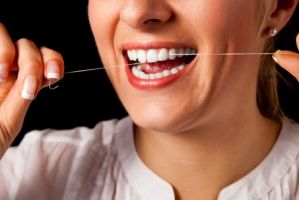Preventive Care Is a Team Effort—
Patient, Dentist, and Dental Staff!
 All of us need to work together to preserve your natural dentition, or natural teeth, and their supporting structures within your mouth. It starts at home with good oral hygiene and a balanced diet. It continues in our office, with regular dental exams, cleanings, and x-rays. We may also use sealants and fluoride to help protect your teeth, too.
All of us need to work together to preserve your natural dentition, or natural teeth, and their supporting structures within your mouth. It starts at home with good oral hygiene and a balanced diet. It continues in our office, with regular dental exams, cleanings, and x-rays. We may also use sealants and fluoride to help protect your teeth, too.
Twice yearly preventive visits to the dentist are a good idea for the average person. Seeing the dentist for a dental exam will help in finding early signs of periodontal disease (gum disease) or cavity detection. Let us help you have a healthy, confident, and beautiful smile that lasts a lifetime!
Routine Cleaning and Exam
What You Can Expect
-
Examination of diagnostic x-rays (radiographs): Essential for detection of decay, tumors, cysts, and bone loss. X-rays also help determine tooth and root positions.
-
Examination of existing restorations: Check current fillings, crowns, etc.
-
Examination of tooth decay: Check all tooth surfaces for decay.
-
Oral cancer screening: Check the face, neck, lips, tongue, throat, cheek tissues, and gums for any signs of oral cancer.
-
Oral hygiene recommendations: Review and recommend oral hygiene aids as needed (electric toothbrushes, special periodontal brushes, fluorides, rinses, etc.)
-
Teeth polishing: Remove stain and plaque that is not otherwise removed during tooth brushing and scaling.
-
Periodontal Assessment: Check pockets depths to determine bone loss and periodontal disease.
Periodontal cleanings are cleanings that are for those patients that have periodontal disease, and go beyond regular cleanings, because our goal is to control the disease and prevent infection. This involves special cleaning and disinfecting both above and below the gums.
After your periodontal treatment, the dentist will recommend hygienic periodontal cleanings, usually four times a year. During these cleanings, pocket depths will be carefully checked to ensure they are healthy. Plaque and dental calculus that are difficult for you to remove on a daily basis will be removed from above and below the gum line.
For more information on periodontal disease, click here.
Remember, good oral hygiene practices and routine cleanings are essential in maintaining great dental health!